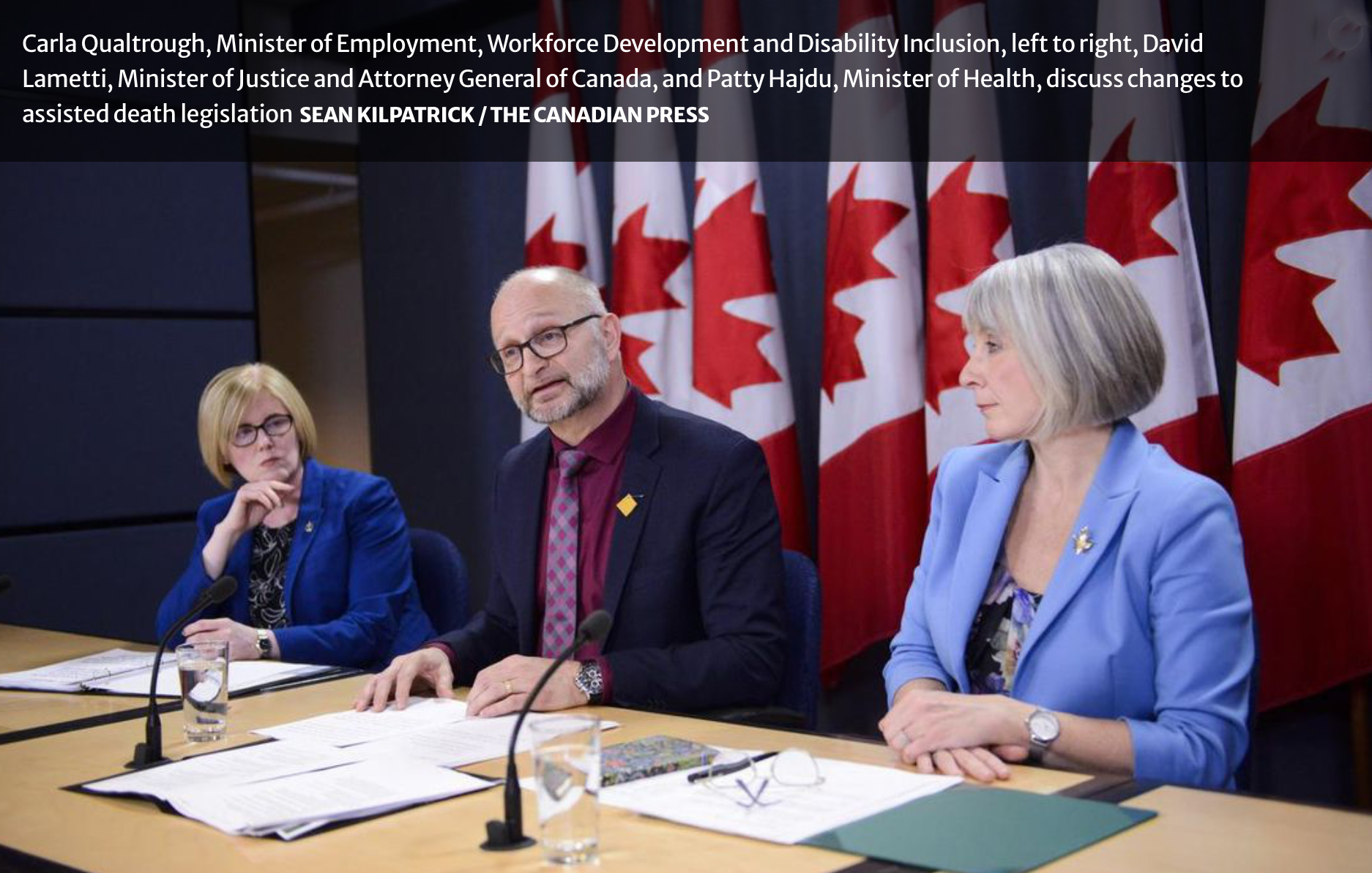
(The Hamilton Spectator – Saturday, December 5, 2020)
Today is a good day to talk about the vulnerable among us – the mentally ill and the disabled – and doctor-assisted death.
Worldwide, only about five per cent of 195 nations allow what’s known in Canada as MAiD, or Medical Assistance in Dying. The World Medical Association also condemns the practice.
Even so, in 2016 Ottawa legislated MAiD as an end-of-life option for Canadians suffering grievously and facing imminent death. More than 13,000 Canadians have since opted for it, the government reported earlier this year.
Disabled persons, unless terminally-ill, never qualified for MAiD. The same for Canadians with mental illness. It was well-reasoned, a severe mental illness that might make you want to harm or kill yourself shows you’re not of clear mind, and you need treatment, not death.
But that was then. Now Parliament faces a Dec. 18 deadline from a Quebec court to expand MAiD. And Bill C-7 proposes that while you must be suffering, you need not be near death to access MAiD. The disabled would also be eligible. Legal arguments have also been made to Parliament that the mentally ill – which Bill C-7 currently protects – also be able to eventually access MAID.
Which is to say, you have to wonder if the train is not flying off the track.
Because there are treatments proven for decades to significantly improve the lives of people with mental illness. It’s long established, and physicians agree widely: treatment is the most effective route.
The issue is not that treatment doesn’t work, but rather that, even in a privileged place like Canada, it can be hard to access. In fact, unless you can pay out-of-pocket, 6,000 Ontarians are now waiting for tertiary psychiatric care.
This is because Canadian mental healthcare is woefully underfunded. As a percentage of overall health spending, Canada lags near the bottom of OECD nations. Consider also that treatment – psychotropic medicine, or cognitive therapy, or broader community supports to help you out of addiction or poverty – can take many more months to work effectively.
So the truth is that your life is worth more than you can imagine. But treatment takes time. But what if you’re now presented with a more expedient option to simply reflect on your struggles for a shorter duration, and then choose, if you wish, state-sponsored death? It’s breathtaking.
Dr. John Maher, a Canadian psychiatrist specializing in severe mental illness who’s also editor-in-chief of the Journal of Ethics in Mental Health, puts it aptly. “With this draft legislation, we’re making it easier to kill yourself than wait for treatment. There’s a terrible perversity to this.” Maher adds, “We’re talking about the normalization of suicide.”
And the disabled? The UN has already criticized Canada for not better safeguarding our disabled. It’s no wonder, then, that many in Canada’s disabled community vehemently oppose Bill C-7, because it implicitly suggests that it’s better to be dead than live with a disability.
You’d be forgiven for imagining that this is all from some dystopian novel, where people exit life as conveniently as a fast-food drive-thru. But, really, how many will opt for this exit because their society, which doesn’t value disability or suffering, has failed them? How many, like the infirmed among us, will not want to be a burden?
Finally, consider the alarming rate of young Canadians struggling with depression and anxiety and the crippling sense that life has no purpose or meaning. The Generation Distress report, led by the Toronto Star, explores it well. Imagine this now, too: the horribly unexpected exit of, say, your son. He was so bright. Or your daughter, your beautiful girl. Or your brother. Or sister. Gone.
If they had cancer, we’d fight hard for them. Heart disease? Let’s do everything in our power. COVID-19? Send in the troops to protect and care for them. So what about the mentally ill and disabled? The infirmed? The voiceless?
If this disturbs you, it’s because you’re alive and you want your loved ones, and the vulnerable among us, to be the same, with better supports, not access to the dark side of MAiD. And remember, in a place like Canada, your voice matters. So if you wish, voice your concern about Bill C-7 to Canada’s Senate and your locally-elected MP. You can find information through www.ourcommons.ca/members or www.canadiansforconscience.ca
You might save a life. Who knows? It might even be your own.

So true – we have already contacted our government representatives.
Bravo!!!
Good to know.
Let’s hope someone is listening.
MAID for all! Yes, I’m a proponent. My life my choice and it’s assisted death not suicide. On my terms when and where and with whom I choose. Please get past trying to save everyone and think of your own death that may not be as perfect as you expect. My life, my choice.
Well, Dan, thanks for a countering viewpoint. We certainly have many life choices, and thank God for this. But in terms of the “it’s my life” approach, are you saying that you gave yourself your own life? And what about the most vulnerable among us?